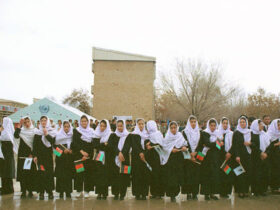LOS ANGELES — Germany’s 2021 federal election occurred on Sept. 21, with Olaf Scholz set to become Germany’s next chancellor. Though the election is over, it was rife with interference by Russian actors.
According to Foreign Ministry spokeswoman Andrea Sasse, the Russian hacker group Ghostwriter had been “combining conventional cyberattacks with disinformation and influence operations,” and that activities targeting Germany have been observed “for some time.” The group attempted to use phishing emails to get hold of personal login details of federal and state lawmakers.
“The German government has reliable information on the basis of which Ghostwriter activities can be attributed to cyber-actors of the Russian state and, specifically, Russia’s GRU military intelligence service,” Sasse said.
Russia has a sporadic history with election interference. Russian meddling takes different forms depending on the state and the election occurring. One of the earliest cases of Russian election interference was the failed attempt to influence France’s 2017 presidential election. Russian hackers leaked data taken from candidate Emmanuel Macron’s presidential campaign in what is now referenced as the Macron Leaks. A mix of real and forged emails were circulated with the intent to divide French society. The leaked emails included staffers’ personal and professional emails,contracts, and campaign finance information. The content didn’t get a lot of news coverage because France has a national moratorium on campaigning and media coverage that begins 44 hours before a presidential election. This is meant to prevent a last-minute story from swaying the election.
After failing to influence the French elections, Russia made another attempt with Germany’s 2017 presidential elections. In her testimony during the U.S. Senate Intelligence hearing on Russian election interference, Constanze Stelzenmueller, Fritz Stern Chair at the Brookings Institute, explained that Russia chose to target Germany because it believed that weakening Germany would thereby weaken the European Union.
Relations between Germany and the EU worsened since Russia’s illegal annexation of Crimea in 2014. Following the annexation, the EU imposed a variety of economic sanctions and restrictive measures that Russia is still recovering from. Russia wants to prohibit EU operations for fear that the EU will gain power in the Eastern Partnership countries which include: Armenia, Azerbaijan, Belarus, Georgia, the Republic of Moldova and Ukraine. Russia currently considers these states to be in its sphere of influence.
Stelzenmueller also says that Germany is Russia’s main obstacle in pursuing their interests in Europe and Ukraine. For example, Russia was not happy that Germany had orchestrated additional European sanctions against Russia in 2017.
Russian election intervention has taken many forms, both technical and otherwise. Janis Sarts, Director of the NATO Strategic Communication Center of Excellence gives several examples in her prepared statement on “Russian Interference in European Elections United States Senate Select Committee on Intelligence.” In the statement, Sarts writes that, “financing pro-Russian candidates and political parties and offering the Kremlin media as platform, cyber-attacks against candidates Russia perceives as unfriendly, and malicious disinformation using social media bots and Kremlin-aligned fringe media outlets” are all examples of how Russian election meddling occurs.
A notable example of a Russian disinformation campaign is the “Lisa case.” The case is the story of a 13 year-old Russian-German girl who had gone missing and was reported by Russian television to have been raped by Arab migrants. The story turned out to be fake, but it was heavily covered in Russian media and resulted in diplomatic tensions between Germany and Russia.
A more technical example is the two-day DDOS (distributed denial of service attack) conducted by the Russian hacker group CyberBerkut on German government computers. The Russian government does not claim to be affiliated with the group. A DDOS attack occurs when a malicious computer floods a target with so many requests that the target can’t respond to legitimate requests, rendering it unable to service legitimate customers. The attack was timed to coincide with Ukraine Prime Minister Arseniy Yatsenyuk’s 2015 state vision. The hackers called on Germans and the German government to end financial aid for the “criminal government” in Ukraine.
Russia interfered again in Germany’s 2021 federal elections, where Chancellor Angela Merkel stepped down after 16 years in office. A disinformation group called “Ghostwriter,” that has been linked to Russian military intelligence, sent a wave of phishing emails to German officials with the goal of undermining public trust in the institutions.
Germany has responded verbally but has not yet taken any tangible action against Russia. On Sept. 6, Sasse told reporters that “the German government calls on the Russian government in all urgency to end this unacceptable cyber activity immediately”.
Releasing a statement is not a significant enough response from Germany. As a leader of the E.U., Germany must take a firmer stand against Russia, as should the United States, another two-time victim of Russian meddling.
A bipartisan U.S. Senate report released in April of 2020 found that Russia interfered on former President Donald Trump’s behalf in the 2016 presidential election. The report noted that Russia sought to disparage Hillary Clinton’s image and undermine public faith in the democratic process; moreover, the report stated that Russian President Vladmir Putin “approved and directed aspects of this influence campaign.”
Earlier this year, the U.S. National Intelligence Council released a report that came to similar conclusions about both Russia and the specific role of Putin.
Similar to Germany, the U.S. response to Russia interference has been lacking. Despite Russia tampering with the sanctity of the U.S. elections twice, current President Joe Biden refuses to take measures against the country for its actions. The U.S. response to Russia has thus far been prohibiting U.S. institutions from buying Russian bonds and expelling 10 Russian diplomats from the United States
In a speech at the White House on April 15, Biden stated that “the United States is not looking to kick off a cycle of escalation and conflict with Russia. We want a stable, predictable relationship. ” I believe that President Biden should take a firmer stance against Russian interference. While it can be said that President Biden’s sanctions are punishing Russia’s bad behavior, they do not deter it. The next step for the U.S. is to continue to target Russia economically with the help of the U.S.’s European allies.
With Russia’s history of election interference now public and its methods exposed, the question now arises: what is the solution?
There must be an international agreement to prohibit foreign election interference led by the United States with the engagement of Germany and other U.S. allies. The United States is in the best position to lead this charge because it is seen as the most powerful country in the United Nations and its greatest contributor. Other countries would form a coalition because every citizen has the right to a free and fair election, as described by the Universal Declaration of Human Rights that states, “‘[t]he will of the people shall be the basis of the authority of government; this will shall be expressed in periodic and genuine elections which shall be by universal and equal suffrage and shall be held by secret vote or by equivalent free voting procedures.”
This agreement is likely to be successful because it won’t be the first time several states have come together to protect the electoral system. For example, in December 2013, the UN adopted the resolution on ‘Strengthening the role of the United Nations in enhancing periodic and genuine elections and the promotion of democratization,’ which affirmed that “member states are responsible for organizing free and fair electoral processes” and “noting also that the international community can contribute to the creation of conditions which could foster stability and security throughout the pre-election, election and post-election periods in transitional and post-conflict situations.” Any agreement must clearly state the consequences of future interference. The new agreement would establish a precedent and provide guidelines for future events.
Once the coalition is in place, the United States should engage with Russia directly. This engagement can take the form of economic sanctions that have actual consequences. According to Agathe Demarais, global forecasting director at The Economist Intelligence Unit, “the latest round of U.S. sanctions was a mostly symbolic exercise.”
A symbolic exercise won’t be enough to enact real change. As for an idea of what future sanctions could be like, Liam Peach, emerging markets economist at Capital Economics, said that sanctions would be more effective if they affected all of sovereign debt.
Overall, a serious, well-planned movement, such as the one described above, is needed to deter Russia from future election meddling.







